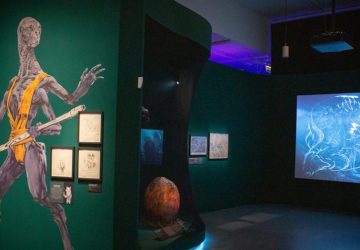Listen to the article
Metropolis cinema, once bustling with a loyal audience, witnessed an ongoing renaissance in its programming over the years. Forced to close its doors in 2020 amidst social, political and economic upheaval, it is now poised to construct an innovative space in Beirut, directly facing the port. This new venue aims to unite institutions, artists, researchers, students, filmmakers and cinema enthusiasts.
The 2019 revolution and subsequent crisis profoundly impacted the country. Metropolis permanently closed in January 2020 due to the sale of the property. During the pandemic, as health regulations allowed, Metropolis hosted movie screenings at various locations. However, the 2020 Beirut port explosion brought additional challenges and introspection for the team. When asked, “Why now, and why establish Metropolis again as a venue?” Hania Mroue, Director and Founder of the Metropolis Association, responded, “Despite the circumstances, no one in our team considered leaving Lebanon or changing professions. Establishing a hub for independent cinema emerged as a clear mission to us. By the end of 2020, we had conducted feasibility studies on around forty potential sites, including closed schools, warehouses, abandoned factories and old houses. Our goal was to up-cycle without further burdening suffocating Beirut with concrete. With fluctuating rents due to the Lebanese lira’s inflation, long-term commitment became invaluable. Our efforts were bolstered by early support from the French Embassy and the CNC. Lacking a fixed location, we fortuitously found a plot of land available for long-term use. In a moment of sheer audacity, the idea of constructing… a tent occurred to me. For someone in cinema, the construction process seemed straightforward. Fortunately, our partners shared our belief.” For Hania Mroue, building a permanent site near the port also symbolically represents anchoring, “Otherwise, we would be rootless. Architect Sophie Khayat was a huge support in designing the project.” Sophie Khayat added, “The warehouse on the site acts as a barrier against the highway noise, enhancing our environmental footprint. The connected spaces foster cultural interactions and exchanges, while the gardens add an ecological dimension… The structure’s lightweight design is also crucial for future dismantling.”
Discussing the enduring connection of Metropolis with its past and its bridge to innovation, Hania Mroue affirmed, “This project continues the legacy of Metropolis, established in 2006 as the first cinema of its kind in the Arab world. This marks a mature phase for us as it will be our third location; from our first venue at Saoula to Sofil. Over eighteen years, we have built a network of trust and garnered a loyal and curious audience amid political, security and financial instability. Metropolis originally opened on July 11, 2006, just one day before a war broke out. We have evolved by coexisting with both national and international fervor… Eyes are now turning towards the Global South, highlighting cinematic experiences in Africa and Latin America.”
Regarding the decentralization of activities throughout the project, she noted, “Since 2021, we have been identifying suitable locations to temporarily transform into cinemas; from the esplanade of the Sursock Museum to a garden in a hotel in Chouf, a café in Tripoli, to the stunning Ishbilia Theater in Saida…” Concerning the archiving of national heritage, Hania Mroue stated, “Since 2015, we have operated a virtual cinémathèque in Beirut, which has evolved into a physical space in Mar Mikhael to preserve collective memory. Cinémathèque Beirut is our own IMDb, tailored for Lebanese cinema, including golden age films.” Sophie Khayat mentioned, “In our construction, we’ve created ‘voids’ under or near the theatres. One of these voids will host the new cinémathèque.”
This architectural vision of Metropolis incorporates lightweight, eco-friendly structures, with plans to install solar panels eventually, achieving unmatched technical feats in collaboration with engineers and consultants. Acoustic engineer Fouad Bechwati confirmed that the acoustics are the clearest he has ever encountered. Regarding aesthetics, Sophie Khayat explained, “We opted for neutral colors that reflect the greenery. Two Metropolis-red corridors will gradually lead to the cinemas where colors become more prominent. The industrial feel of the metal structure is balanced with the softness of other materials like fabric, wood, lights and forms to maintain a human touch.” Hania Mroue emphasized the simplicity of the “welcoming and accessible” Metropolis cinemas, a departure from today’s luxurious venues, “to ensure comfort for all audiences.”
In a flurry of festivals, Metropolis retains a distinct identity. Hania Mroue added, “We questioned whether these new initiatives, while a natural evolution, were supplanting our project and whether it was time to move on…” She concluded, “We realized that Metropolis is neither a festival nor an event organizer, but a permanent, inspiring location for meetings to support independent cinema. Our commitment is long-term: We believe in this country and choose to stay. This is our message to the youth who wish to remain: ‘We are here with and for you.'”
Instagram: @mariechristine.tayah














